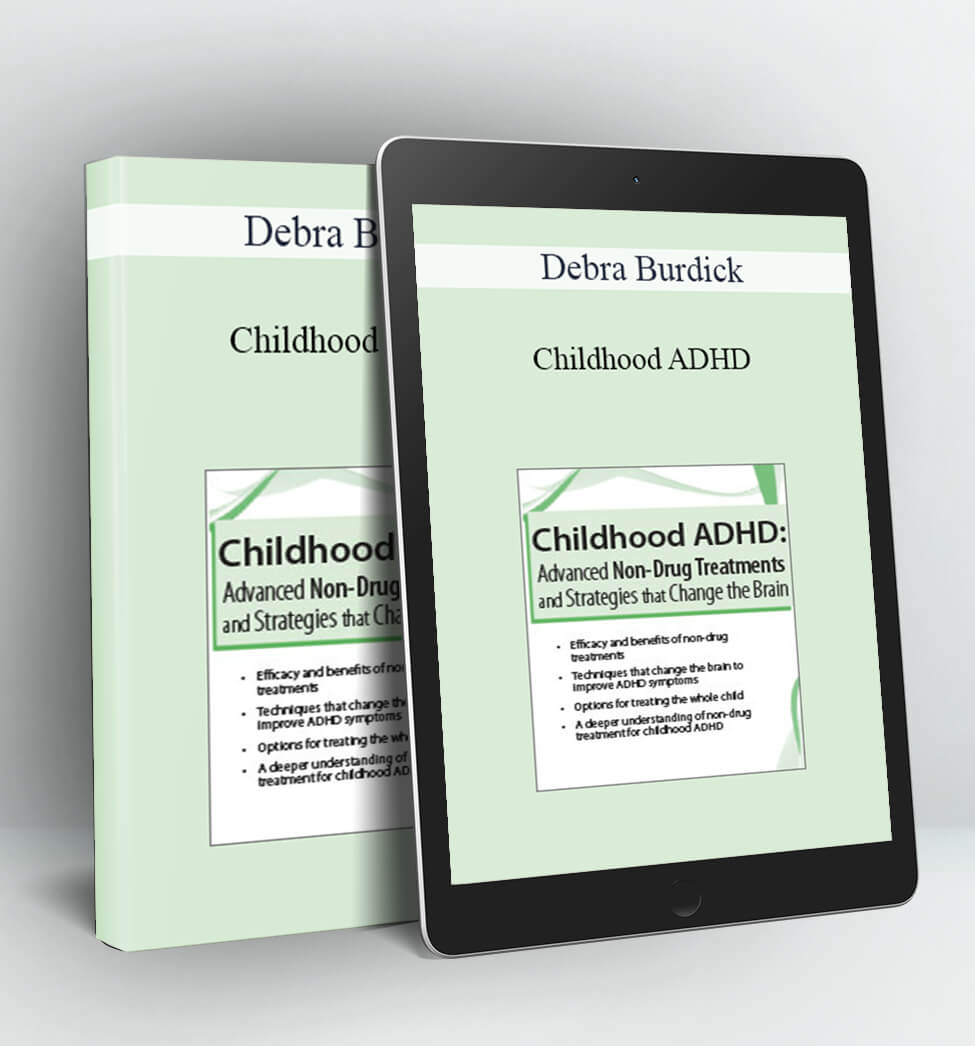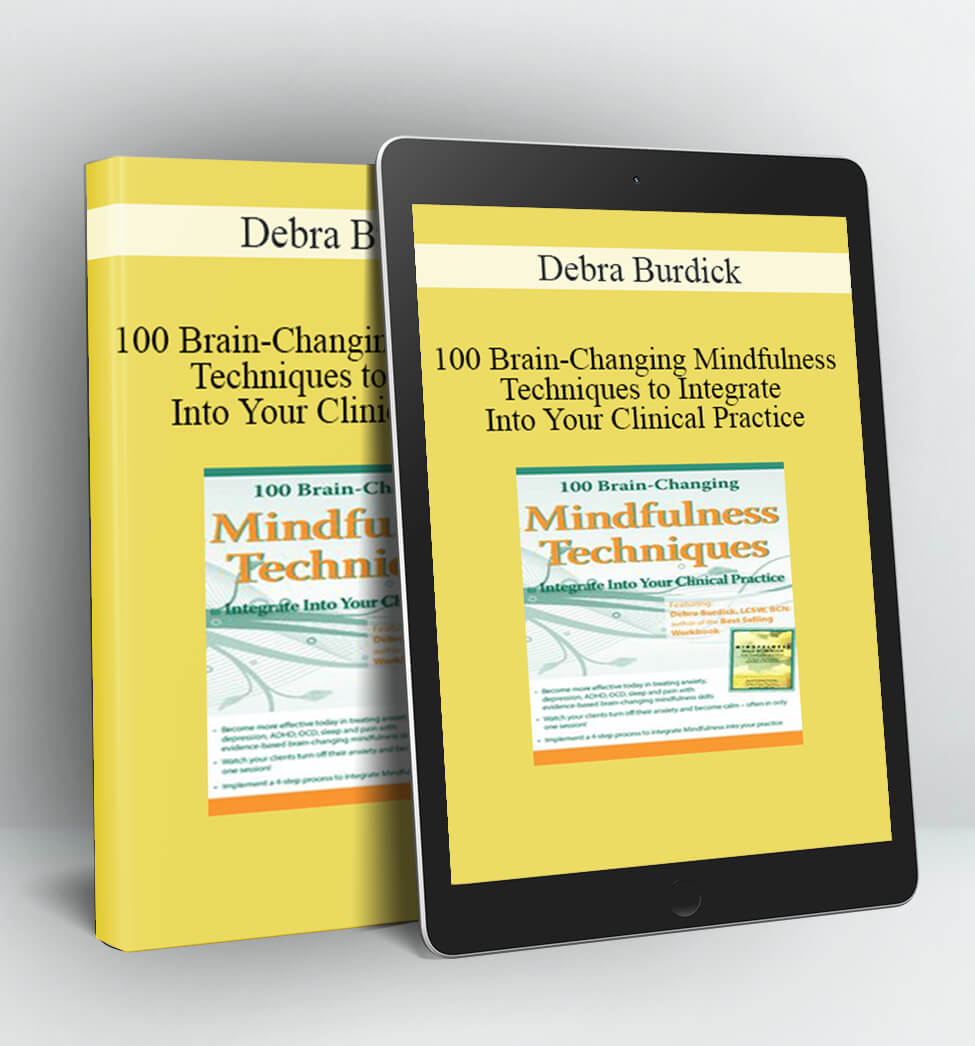
Childhood ADHD – Debra Burdick
- Faculty:
- Debra Burdick
- Duration:
- 6 Hours 23 Minutes
- Format:
- Audio and Video
- Copyright:
- Jun 20, 2014
Description
- Efficacy and benefits of non-drug treatments
- Techniques that change the brain to improve ADHD symptoms
- Options for treating the whole child
- A deeper understanding of non-drug treatment for childhood ADHD
Although medication has been the traditional first line of treatment for childhood ADHD, there are many kids and teens for whom medication is not the best option. You will learn when to consider and how to incorporate non-drug options into your treatment plan. The more you understand about the non-drug treatments for ADHD the more comprehensive, individualized and effective your treatment will be.
Learn about cutting edge non-drug treatments for ADHD as well as the efficacy and neurobiology of each treatment. Finally understand what neurofeedback is, how it works, and why the American Academy of Pediatrics added biofeedback/neurofeedback to its list of best treatment modalities for ADHD. You will learn and practice brain-based mindfulness skills that help kids and teens slow down, calm down, concentrate, and feel better about themselves. Master skills for helping kids, teens, and their parents make ADHD-specific changes in their diet, sleep, behavior, organization, exercise, and environment that support their success. Options for addressing low self-esteem, depression, and anxiety that so often accompany ADHD will also be discussed.
Debra Burdick, LCSWR, BCN, a psychotherapist, neurotherapist, author and ADHD and mindfulness expert will show you how to put all the pieces together and give you new skills that will improve your treatment outcomes for working with clients with ADHD. The recording will include case examples, experiential learning, tools for tracking treatment progress and a wealth of worksheets and resource materials to use with your clients.
Handouts
| Manual (4 MB) | 125 Pages | Available after Purchase |
Outline
Strategies to Make an Accurate Diagnosis
- Review of the DSM-5® Criteria
- Tools for Diagnosis: Structured Interview, Symptom Checklists, TOVA, IVA, QEEG, Neuropsych Testing
- Recognize Contributors to (or mimics of )Symptoms of ADHD
- Neurobiology of ADHD
- Types of ADHD
- Co-morbid Disorders
Cutting Edge Non-Drug Treatment Options
- Psychotherapy and/or Coaching
- What Works and What Doesn’t for ADHD
- Self-esteem, Depression, Anxiety
- Neurofeedback
- Efficacy for Neurofeedback
- Treatment Process
- Case Examples
- Sample Systems
- Mindfulness for Kids and Teens with ADHD
- Research on Effectiveness for ADHD
- Neurobiology
- Skills to teach your clients for:
- Concentration, Hyperactivity, Self-esteem, Movement, Depression, Anxiety
- Case Examples
- Review of Complimentary Therapies
- Interactive Metronome®
- Sensory Integration Therapy
- Nutrition for the ADHD Brain
- Sugar
- Food additives
- Food Allergies
- Common Deficiencies
- Supplements
- Organic?
- The Role of Exercise and Movement on the Brain and ADHD
- Sleep
- The Impact of ADHD
- Strategies for Regulating
- Strategies to Improve Behavior and Relationships
- Behavior Management
- Social Skills
- Organizational Skills
- Site of Performance Skills and Systems
- Systems for Organizing Time, Space and Activity
- Environment
- Screen Time
- Toxins
- Strategies for Success at School
- PPT, IEP, Accommodations
- Study Strategies
- Track Treatment Progress
Faculty
Debra Burdick, LCSW, BCN Related seminars and products: 6
Debra Burdick, LCSW, BCN, also known as ‘The Brain Lady’, is a Licensed Clinical Social Worker and a board certified neurofeedback practitioner. Debra is an international speaker and author of the best-selling books, Mindfulness Skills Workbook for Clinicians and Clients: 111 Tools, Techniques, Activities & Worksheets (PESI, 2013), Mindfulness Skills for Kids & Teens: A Workbook for Clinicians & Clients with 154 Tools, Techniques, Activities and Worksheets (PESI, 2014), ADHD: Non-Medication Treatments and Skills for Children and Teens (PESI, 2015) and Mindfulness Skills for Kids: Card Deck and 3 Card Games (PESI, 2017). She has taught mindfulness skills to her clients for over 25 years.
She recently retired from her private practice, and previously worked at the Child Guidance Clinic, Family Services, Child and Family Agency, and Lawrence and Memorial Hospital.
Debra incorporates mindfulness skills in all areas of her practice. She initially became interested in mindfulness to deal with a chronic illness (now thankfully healed). She found it so helpful in her own life that she started teaching her clients the skills she was using. She went on to develop clinical material on mindfulness skills and created a four-step process for working with clients using mindfulness that she perfected in her private practice and in an intensive outpatient program. Her clients have shown her that mindfulness skills improve the rate and quality of treatment outcomes.
Debra has presented numerous presentations, workshops, and teleseminars. She is often interviewed on Internet radio and telesummits and her work has been featured in The Day newspaper, Self-Improvement Magazine, and “Parenting Powers” television show.
Speaker Disclosures:
Financial: Debra Burdick maintains a private practice. She is an author for Vervante publishers and receives royalties. She receives a speaking honorarium from PESI, Inc.
Nonfinancial: Debra Burdick contributes to SelfGrowth.com and receives no compensation.
Access Download Childhood ADHD – Debra Burdick right now!
Delivery Method:
After your purchase, you’ll get access to the downloads page. Here, you can download all the files associated with your order.
Downloads are available once your payment is confirmed, we’ll also send you a download notification email separate from any transaction notification emails you receive from Coursedownloads.





